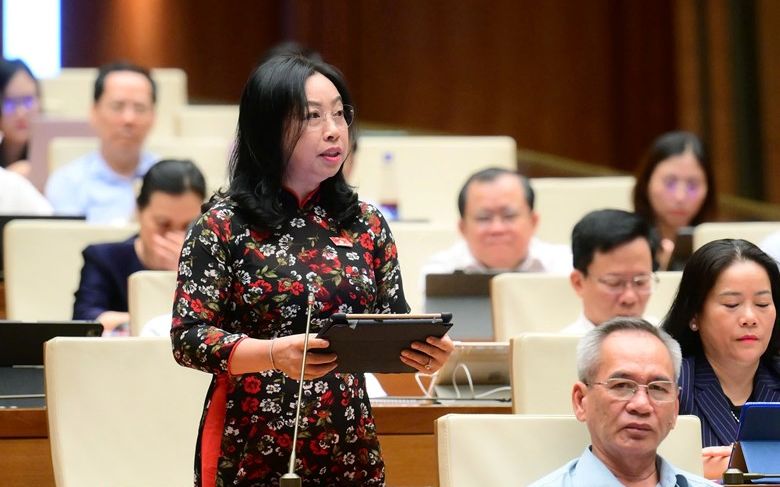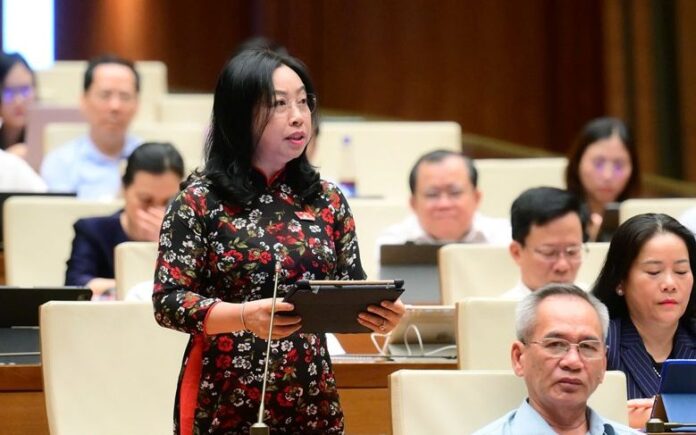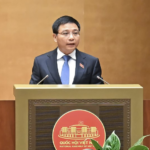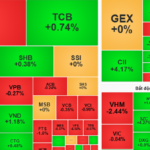Electricity and gold prices are rising, but minimum wages are not keeping pace
On June 18, during discussions about economic and social development plans, delegate Thai Thu Xuong from Hau Giang province raised concerns about the impact of rising prices on workers’ livelihoods.
According to the delegate, voters, especially industrial workers, are facing a double burden. On the one hand, the increase in electricity prices has led to a rise in food prices. On the other hand, job insecurity, declining incomes, and precarious livelihoods persist.
Since 2023, EVN has adjusted electricity prices upward four times, amounting to a 17% increase. In contrast, the minimum wage for workers has only increased once, by 6%.
“This disparity means that many workers cannot afford their basic daily needs, let alone save or invest for the future,” stated Ms. Thai Thu Xuong.

Delegate Thai Thu Xuong (Hau Giang province)
Ms. Thai Thu Xuong argued that industrial workers, who are directly involved in creating material wealth for society, are not receiving adequate attention. They often live in cramped rented rooms with basic amenities and struggle to make ends meet.
Based on this reality, the delegate, on behalf of the industrial workers, proposed that the government implement measures to curb inflation and stabilize the prices of essential goods, particularly electricity, food, and commodities. Additionally, she suggested that the government consider adjusting electricity tariffs to provide discounts for low-income earners.
The delegate from Hau Giang urged the government to promptly review and adjust the regional minimum wage starting from July 2025.
“This is not just a technical recommendation but an urgent need arising from the reality of workers’ lives. The regional minimum wage should truly meet the minimum standard of living, as stipulated in the Labor Code,” emphasized Ms. Thai Thu Xuong.
Rampant counterfeit goods and lenient penalties
Regarding the issue of counterfeit, substandard goods, and commercial fraud, Delegate Thai Thu Xuong pointed out that it is not merely an economic problem. It silently undermines the health of the community, erodes social trust, and threatens the survival of legitimate businesses.
Counterfeit and pirated goods are no longer a small-scale phenomenon but have become an intricate underground system, encompassing food, medicine, cosmetics, electronics, and household goods.
According to the delegate, voters expressed concern about the growing difficulty in distinguishing genuine products from counterfeits in the market. Many honest businesses that invest significantly in product development are at a disadvantage because they cannot compete with cheap, tax-evading, and law-flouting counterfeiters.
The delegate called for the early completion of the legal framework and the imposition of stricter penalties to ensure effective deterrence. She emphasized that the current situation, where counterfeit goods proliferate and penalties are limited to light administrative fines, is unacceptable.
Echoing this sentiment, Delegate Mai Van Hai from Thanh Hoa province suggested the need to continuously review and improve legal regulations on the production and trading of goods. He also proposed strengthening post-market inspections for commodities related to human health and increasing penalties to deter violations effectively.

Delegate Mai Van Hai (Thanh Hoa province)
Mr. Mai Van Hai emphasized the necessity of specifying the responsibilities of central and local agencies, organizations, and individuals in managing and preventing serious cases of production and trading of counterfeit, pirated, and substandard goods.
Meanwhile, Delegate Pham Van Hoa from Dong Thap province raised a concern about the recurring nature of the issue. He pointed out that whenever there are media reports or public outcry about counterfeit, substandard, or unsafe goods, the authorities respond with great determination and a sense of responsibility. However, the situation remains unchanged.
“The issues of counterfeit, substandard, and unsafe goods are not new; they have persisted for many years. Every time delegates bring up these issues at National Assembly meetings, it highlights the inadequacies in the management of functional agencies,” Mr. Pham Van Hoa emphasized.
“Influencer with Millions of Followers Arrested for Selling Fake Health Supplements”
The Ninh Binh Provincial Police have arrested and prosecuted two individuals for their involvement in the trade of counterfeit food products via social media. One of the accused, Le Van Hai, owner of the TikTok channel “Gia dinh Hai Sen” with over 2.6 million followers, is charged with the consumption of over 100,000 substandard food supplement boxes.
The Great E-Commerce App Exodus: Over 120 Online Platforms Bid Farewell
In the first five months of 2025, the Ministry of Industry and Trade collaborated with tax authorities to conduct a comprehensive review, leading to the shutdown of over 120 websites and 48 e-commerce applications that were either inactive or non-compliant with tax registration requirements.













































